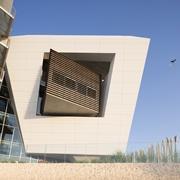Dame Shirley Porter: Vision for the School of Environmental Studies
The Porter School of Environmental Studies (PSES) at the Tel Aviv University (TAU) is the realization of Dame Shirley Porter's vision and commitment.
My interest in the environment began almost six decades ago during walks with my sister-in-law around Westminster in London where we both lived. I often remarked that the litter everywhere wasn’t just an eyesore, but couldn’t possibly be good for the universe; her response to my rather grand declaration was “If you feel that way, why not do something about it…?”
Few people connected the proliferation of plastic bags, which were the latest new thing, abandoned soft drink cans, and general litter with pollution and desecration of the environment. There were “more important” issues to contend with and indeed, most were hard pressed to understand my fledgling passion for the subject.
In 1974, although it wasn’t something I’d ever thought was in the cards, I was elected to the Westminster City Council; it was new and demanding and I threw myself into learning everything I could. A couple of years later, I was appointed Chairman of the Highways and Works Committee. It was a very good fit I thought; I would now have an opportunity to help clean up the city.
To achieve that goal, I needed to find out what was involved. I visited sanitation depots, accompanied dustmen and street cleaners on their rounds, went down into the sewers and launched a variety of catchy press campaigns that caught everyone’s attention. It became a professional and personal pursuit. Though nothing happened overnight or, without resistance, a sense of pride began to emerge from residents and workers alike, and in time the City of Westminster sparkled. It became and remains the most beautiful city in London.
My commitment to the environment was forged.
Twenty years ago, when I left politics and moved to Israel, I decided to focus on the Porter Family Foundation having at the back of my mind that preservation of our planet would continue to be a priority.
There was little interest in the subject in Israel at the time, but I thought, as I had on the Council, that if people were made aware, and educated about their environment, they would come to value and appreciate it. I also believed that only by working together could we find the solutions that are vital to our survival. I wanted Israel to play its part.
It made sense to enlist the brightest minds in the country; environmental issues are complex, political and economic, and addressing them requires the involvement of all levels of society. I also thought the Foundation could achieve the most by working with an institute of higher learning, benefiting from its unique facility for the exchange and development of ideas. If they would agree, Tel Aviv University would be our starting point.
I envisioned a multi-disciplinary school of environmental studies – specifically an EcoBuilding designed to maximize the efficient use of energy, water and materials that would consolidate lectures, research, conferences, and the school’s administration under one roof. I was very interested, too, in applied science: taking academia into the real world. I knew what I had in mind was a huge undertaking but at least I could try.
I approached the president of TAU to discuss the project. I am no environmental scientist but he knew I was serious, and I hoped my track record would back up what might otherwise be viewed as a noble but possibly unworkable idea. I had been a magistrate in the UK for more than ten years, led the Westminster City Council, worked closely with Baroness Thatcher during her time as Prime Minister and been Lord Mayor of Westminster. I understood people at the grassroots and knew the way bureaucracy worked. I’d also seen firsthand how to run a major business enterprise as my father created and established Tesco with little more than good instincts, commonsense and a great deal of hard work.
The president was receptive to the concept, supportive, and enthusiastic -- and also had the perfect location in mind. We walked to the highest point at the university, a large parking lot built on top of an expanse of landfill dumped there from previous construction on the campus. “This” he said, “is where we’ll build your dream.” We both understood the enormous challenges ahead, beginning with the “sow’s ear” we were looking at but agreed we would do our utmost to overcome them. For the most part, I think we have.
Twelve years ago the Porter School for Environmental Studies became a “virtual “ school, and by mid 2014 we will move into the magnificent new building the Porter School will call home. One of only a few schools of its kind in the world, it is my hope – and my vision – it will provide real and practical applications of green technology that establish Israel as a leader of environmental education and sustainability.
A world-ranked School of Environmental Studies that improves the lives of the people – and the land -- of Israel, contributes to global welfare, and becomes an international hub for the environment is our aim. I also hope the Porter School will lead Israel to greater self-sufficiency; relying too much on others is never a good thing.
I visited the university the other day, as I often do. I donned a hard hat, climbed on a crane and was lifted high into the air for an overview of the incredible eco-landmark-in-progress. I have been involved in a great many causes, charities and undertakings over the past sixty years and take pride in them all, but the Porter School of Environmental Studies – the Foundation’s greatest philanthropic commitment -- takes my breath away. And it makes me happy that a place of such beauty can do so much good in our world…
Dame Shirley Porter, February 2013



